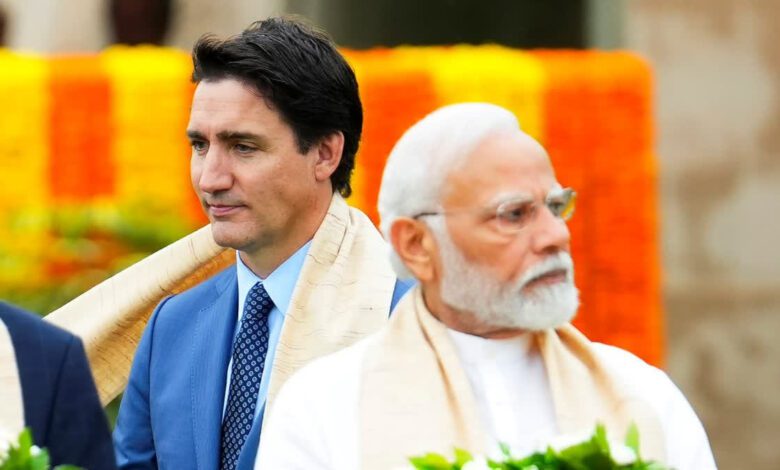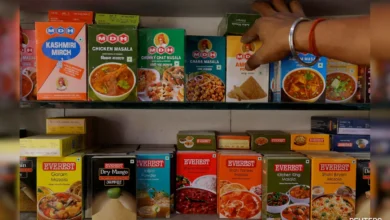India-Canada relations strained amidst allegations of diplomatic intrigue
Expulsion of Top Indian Diplomat and Pro-Khalistan Tensions Heighten Bilateral Concerns

The tensions between India and Canada have escalated due to a recent incident involving the killing of a prominent Khalistani terrorist named Hardeep Singh Nijjar. This led to the expulsion of a high-ranking Indian diplomat by the Canadian government. The situation is further complicated by Canadian Prime Minister Justin Trudeau’s claim of “credible allegations” linking Indian government agents to the assassination.
Who is Hardeep Singh Nijjar?
Hardeep Singh Nijjar was associated with a banned Indian separatist group called Sikhs for Justice (SFJ). He originally hailed from Jalandhar’s Bharsingh Pura village and moved to Canada in 1996. He initially worked as a plumber, but his wealth increased significantly over the years due to his involvement in pro-Khalistan activities.
Nijjar’s involvement in terrorism began with his membership in Babbar Khalsa International, led by Jagtar Singh Tara. Later, he established his own group called Khalistan Tiger Force (KTF). He played a significant role in identifying, connecting, training, and funding Khalistani cells in India, resulting in over 10 FIRs filed against him.
In 2014, Nijjar was the mastermind behind the assassination of self-proclaimed spiritual leader Baba Bhaniara. In 2015, he conducted a training camp in Canada to instruct Mandeep Singh Dhaliwal, who was subsequently sent to Punjab with the mission of targeting Shiv Sena leaders. Mandeep was arrested in June 2016. In November 2020, Nijjar partnered with fellow gangster Arsh Dalla, residing abroad, and together, they were involved in the murder of Manohar Lal, a follower of the Dera Sacha Sauda, in 2021.
India-Canada Tensions
The relations between India and Canada have been strained due to the increasing activities of Khalistani extremists. There have been instances of vandalism at Hindu temples in Canada and a controversial tableau depicting the assassination of former Prime Minister Indira Gandhi during Operation Bluestar.
During a meeting with Canadian Prime Minister Justin Trudeau after the G20 Summit, Prime Minister Narendra Modi expressed India’s concerns about extremist elements in Canada promoting secessionism, inciting violence against Indian diplomats, and threatening the Indian community in the country.
Pro-Khalistan Activities in Canada
Pro-Khalistan activities have surged in Canada, adding to the tensions between the two countries. Canada recently indefinitely postponed a trade mission to India, a decision that Indian officials learned about through the media. Trade talks between the two nations have been suspended due to concerns about subversive activities taking place in Canada.
On September 12, a pro-Khalistani secessionist group called Sikhs for Justice (SFJ) conducted a controversial ‘referendum’ at a gurdwara in Surrey, British Columbia. This occurred shortly after PM Modi had conveyed his concerns to Trudeau in New Delhi. Gurpatwant Singh Pannu, a designated terrorist and founder of the banned SFJ, was also present at this event.
Canada’s Concerns
Canadian Prime Minister Justin Trudeau expressed deep concern over the killing of Hardeep Nijjar to PM Modi during their meeting in New Delhi. He emphasized that any involvement of a foreign government in the killing of a Canadian citizen on Canadian soil is unacceptable and violates their sovereignty.
India’s Response
New Delhi has firmly rejected Ottawa’s allegations of its involvement in Nijjar’s killing. India deemed these allegations as “absurd and motivated.” The Indian Ministry of External Affairs emphasized its commitment to the rule of law and called for prompt and effective legal action by the Canadian government against anti-India elements operating from Canadian soil.
India also expressed concern about Canada providing a safe haven for various illegal activities, including murders, human trafficking, and organized crime. The Indian government urged Canada to take action against these elements and reiterated the importance of addressing the ongoing threat to India’s sovereignty and territorial integrity.
In conclusion, tensions between India and Canada have escalated due to the killing of Hardeep Singh Nijjar and allegations of Indian government involvement. Pro-Khalistan activities in Canada have further strained relations, leading to trade talks being suspended and a call for Canada to address the presence of anti-India elements on its soil. Both nations must work to resolve these issues through diplomatic channels to maintain peaceful relations.
Please, also have a look into : Khalistani terrorist’s alleged ties to Lashkar-e-Taiba fuel India-Canada diplomatic row



